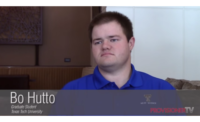[Video] The Ohio State graduate student finds weaning lambs later improves health, weight gain
Allison Pullin, Master’s student in animal welfare and behavior at The Ohio State University, speaks to The National Provisioner editor-in-chief Andy Hanacek about her research on sheep weaning stress and the breakthrough that could increase weight gain and decrease medical costs due to parasitic infection.
Andy Hanacek: Allison, thanks for joining me today on The Ohio State University’s campus outside the Animal Science Building. Talk to me about the graduate work and research you’ve done here at the university and what that has led to.
Allison Pullin: My project is based specifically with sheep weaning stress, so we did a big project last summer up at the Wooster OARDC Sheep Research Unit, and we took a bunch of lambs and we did different weaning strategies. We looked at placing them out to pasture and placing them into a feedlot. We also looked at their social grouping, and then we looked at their effects of the weaning strategy on long-term behavior, part activity so body weight gain and also parasitic infection, because currently weaning stress and parasitic infection are the two biggest welfare issues on sheep farms in the United States.
Hanacek: What did you find through some of that work? Did it lead to any breakthroughs that maybe you want to brag about a little?
Pullin: I would say the key finding… most commonly in the United States particularly in the eastern United States, sheep are weaned at 60 days of age and that’s part an activity decision, a management decision, to help with the lamb being more productive. However, we actually found that by delaying weaning by almost doubling that amount and weaning lambs at 116, they actually have double the body weight gain and they are much less likely to have parasitic infections, so they needed a lot less treatment. We’re seeing greater weight gain, less money for treatment. Those lambs are healthier, so that was probably our biggest finding. By delaying the weaning, we see better results for those lambs.
Hanacek: How did you get hooked with working with lambs and sheep? Do you have a background there, or was it just something that interested you?
Pullin: I also did my undergraduate work here at Ohio State in animal sciences, and Dr. Pairis-Garcia started the last semester of my undergrad. I had always had an interest in ruminant animals and knew I wanted to work somewhere with sheep, beef cattle, and Dr. Pairis-Garcia had this weaning project come up. Actually during my last semester, I competed on the Animal Welfare Judging Team that Dr. Pairis-Garcia coached, and I took her Animal Welfare Behavior class. So that is how I got really interested in Animal Welfare Science and studying animal behavior. From there, I joined her team for my Master’s.
Hanacek: You were saying off camera that you have gotten to go and present some of these results and things. How has Dr. Pairis-Garcia helped you get out there, and what else has she done for the program and what you have been involved with?
Pullin: Dr. Pairis-Garcia is really ambitious in getting her students on farm and getting us out in the industry and to different conferences. So for my sheep research specifically, I’ve had the opportunity to travel abroad two different times and present my research in Denmark and Scotland. Both of those were for meetings of the International Society of Applied Ethology, which is essentially the international body of animal welfare and behavior researchers. I’ve also gotten to attend the Sow Housing Conference here in Columbus that Dr. Pairis-Garcia helped organize and the Midwest Poultry Conference out in Minnesota, so that has also allowed me to get experience in different industries for other species. She’s been really instrumental in helping me get experience in auditing and inspecting farms based on animal welfare standards, and I am also coaching the undergraduate Animal Welfare Team training undergraduate students how to scientifically assess animal welfare.
Hanacek: So what’s the next steps for you? When do you officially graduate and what from there?
Pullin: My next step is to pursue a Ph.D. in animal welfare and behavior. I would really like to work with laying hens, because especially with cage-free housing, there’s a lot of hot topics for welfare research there. So I’m currently applying to Ph.D. programs, and I will graduate with my Master’s in May and then hopefully start the Ph.D. next autumn.
Be sure to check out all the coverage of our November cover story here.
Looking for a reprint of this article?
From high-res PDFs to custom plaques, order your copy today!




